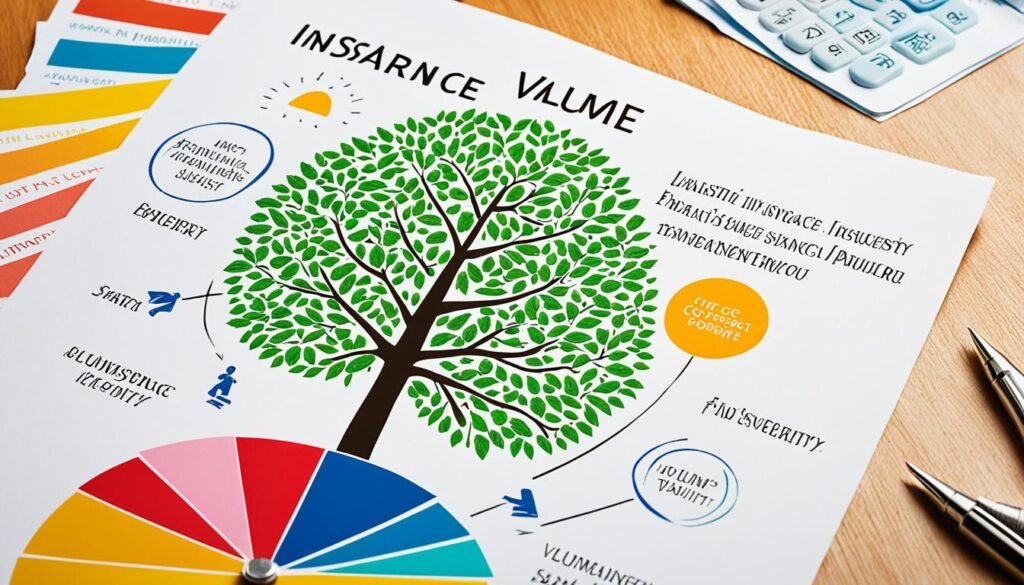Table of Contents
ToggleLump Sum Life Insurance Cash Value provide financial protection and peace of mind for individuals and their loved ones. While most people are familiar with the death benefit component of life insurance, there is another aspect that can hold significant value – the cash value. Understanding the concept of lump sum life insurance cash value is essential for policyholders looking to make the most of their coverage.
Lump sum life insurance cash value refers to the accumulated savings within a permanent life insurance policy. As policyholders make premium payments, a portion of those payments is set aside and invested by the insurance company. Over time, this cash value grows and can be accessed by policyholders.
The cash value of a life insurance policy offers several potential benefits. Policyholders can use it to take out policy loans, providing them with additional funds to meet various financial needs. Alternatively, they may choose to surrender the policy and receive the accumulated cash value outright. This flexibility allows policyholders to tap into the value of their policy when it is most beneficial to them.
When considering life insurance policies and their cash value, it is important to evaluate several factors. The cost of the policy, the desired coverage level, and the potential tax implications need to be taken into account. Consulting with a financial advisor can help policyholders make informed decisions and ensure that they maximize the value of their policy.
Key Takeaways:
- Lump sum life insurance cash value is the accumulated savings within a permanent life insurance policy.
- Cash value can be accessed through policy loans or by surrendering the policy.
- Consider the cost of the policy, desired coverage, and tax implications when evaluating the cash value.
- Consulting with a financial advisor can help policyholders make informed decisions about utilizing the cash value.
Understanding the Cash Value of Your Policy
The cash value of a life insurance policy is a significant component that policyholders should fully comprehend. It serves as a savings account within the policy, gradually accumulating over time. The cash value is funded by a portion of the premium payments made by the policyholder, which the insurance company invests. This accumulation of funds provides various benefits and options for policyholders.
One key advantage of the cash value is that policyholders can access it through policy loans or by withdrawing it outright. Policy loans allow the policyholder to borrow against the cash value while keeping the policy in force. The cash value continues to grow at a guaranteed rate, enabling the policyholder to maintain a level of financial stability. Moreover, the loans taken against the cash value are typically tax-free, providing added financial flexibility.
However, it is important to note that surrendering the policy or not repaying the loan can result in certain consequences. Surrendering the policy may lead to a reduction in the death benefit, leaving policyholders with a diminished coverage amount. Additionally, unpaid loans can accrue interest and have tax implications if not properly addressed. Therefore, policyholders must consider the long-term impact of their decisions to ensure they make informed choices that align with their financial goals.
To illustrate the significance of the cash value in a life insurance policy, consider the following example:
| Policyholder | Cash Value | Policy Loan |
|---|---|---|
| John Smith | $50,000 | $10,000 |
| Emily Johnson | $75,000 | $0 |
As shown in the table above, John Smith has a cash value of $50,000 in his policy, while Emily Johnson’s policy has a cash value of $75,000. Furthermore, John has utilized a policy loan of $10,000, while Emily has not taken out any loans against her policy. This example demonstrates the varying cash values and policy loan usage among policyholders, highlighting the personalized nature of life insurance policies.
It is crucial for policyholders to analyze their individual needs and financial goals when considering utilizing the cash value of their policy. By assessing the potential benefits and risks associated with policy loans and withdrawals, policyholders can make informed decisions that align with their unique circumstances.
The cash value of a permanent life insurance policy provides financial options and stability.
How to Build Cash Value in Your Voluntary Life Insurance Policy?
Building cash value in a voluntary life insurance policy is an essential aspect of maximizing its benefits and financial potential. By implementing specific strategies and making informed decisions, policyholders can accelerate the accumulation of cash value over time. Here are some key steps to consider:
- Paying premiums consistently: Regular premium payments are crucial for building cash value. By fulfilling premium obligations promptly, policyholders ensure a steady flow of funds into the policy, allowing the cash value to grow.
- Choosing a permanent life insurance policy: Permanent life insurance policies, such as whole life or universal life insurance, offer the opportunity to build cash value. Unlike term life insurance, permanent policies have a savings component that contributes to the cash value.
- Paying extra premiums: Making additional payments beyond the required premium amount can expedite the accumulation of cash value. These extra premiums directly contribute to the cash value portion of the policy, increasing its growth potential.
- Monitoring policy performance: Regularly reviewing the performance of the policy and its cash value is essential. Policyholders should stay informed about the growth rate and ensure it aligns with their financial goals.
- Utilizing dividends: Some permanent life insurance policies offer dividends, which can be reinvested into the policy to enhance cash value growth. Leveraging these dividends can help accelerate the accumulation process.
- Borrowing against the cash value: Policyholders can access funds and build cash value by utilizing policy loans. However, it’s crucial to consider the potential consequences, as borrowing against the cash value may reduce the policy’s death benefit.
Implementing these strategies can help policyholders build substantial cash value in their voluntary life insurance policies. By combining consistent premium payments, smart policy choices, and informed decision-making, individuals can unlock the full potential of their policies.

Example: Illustration of Cash Value Growth
| Year | Cash Value |
|---|---|
| 1 | $10,000 |
| 5 | $15,000 |
| 10 | $25,000 |
| 15 | $35,000 |
| 20 | $50,000 |
“Building cash value in a voluntary life insurance policy requires discipline, consistent payments, and smart policy selections. By following these steps, policyholders can create a strong foundation for financial security and leverage the full benefits of their life insurance policies.”
The Benefits of Borrowing Against Your Policy’s Cash Value
Borrowing against the cash value of a life insurance policy offers several advantages. The interest rates on policy loans are typically lower than those of traditional loans, and the interest paid goes back into the policy, increasing its cash value. Policy loans do not require credit checks or fixed repayment schedules, providing financial flexibility to use the funds for any purpose. The loan proceeds are generally not considered taxable income, reducing overall tax burden.
With policy loans, policyholders have the ability to access the cash value that has accumulated in their life insurance policy. Unlike other types of loans that require extensive paperwork and verification, policy loans can be obtained quickly and without the hassle of credit checks.
Additionally, the interest rates on policy loans are often lower than those of traditional loans, making them an attractive option for borrowing funds. The interest paid on policy loans goes back into the policy, which helps to grow the cash value even further. This means that policyholders can benefit from the growth of their policy’s cash value while simultaneously accessing the funds they need.
One significant advantage of policy loans is the financial flexibility they offer. Unlike traditional loans that come with fixed repayment schedules, policy loans do not require specific monthly payments. This flexibility allows policyholders to use the borrowed funds for a variety of purposes, such as paying for medical expenses, funding education expenses, or covering unexpected financial emergencies.
Another key benefit of policy loans is the tax advantage they provide. The loan proceeds are generally not considered taxable income, which means policyholders can access the funds without incurring additional tax liabilities. This can make a significant difference in reducing the overall tax burden and maximizing the financial benefits of borrowing against the policy’s cash value.
Key Benefits:
- Lower interest rates compared to traditional loans
- Interest paid goes back into the policy, increasing cash value
- No credit checks or fixed repayment schedules
- Financial flexibility to use funds for any purpose
- Loan proceeds are generally not considered taxable income
Borrowing against the cash value of a life insurance policy can provide policyholders with the necessary financial flexibility to meet their current financial needs. With lower interest rates, the potential for increased cash value, and the ability to use the funds for any purpose, policy loans offer a convenient and advantageous borrowing option.
Risks Involved in Borrowing Against Your Policy’s Cash Value
While borrowing against the cash value of a life insurance policy can offer various benefits, it’s important to consider the associated risks. Understanding these risks will help you make informed decisions about accessing your policy’s cash value.
Reduced Dividend Amount and Policy Lapse
When you have an outstanding policy loan, the amount of dividend credited to your policy may be reduced. Dividends are typically used to increase the cash value and death benefit of your policy. By borrowing against your cash value, you are essentially withdrawing a portion of these dividends, which can impact the growth potential of your policy.
If the loan balance exceeds the cash value of your policy, it can potentially cause the policy to lapse. A policy lapse means you no longer have an active life insurance policy, resulting in a loss of coverage and potential financial consequences.
Tax Implications
There may be tax implications associated with borrowing against your policy’s cash value. If your policy lapses due to an outstanding loan balance, the loan balance plus interest may be considered taxable income. This means you could owe taxes on the amount of the loan and interest, which could lead to unexpected tax liabilities.
Repaying Policy Loans
To maintain the cash value and death benefit of your policy, it’s crucial to repay policy loans in a timely manner. Failing to repay the loan can erode the cash value of your policy, impacting its growth potential and reducing the available funds for future needs.
It’s important to carefully consider the risks involved in borrowing against your policy’s cash value and evaluate whether it aligns with your long-term financial goals. Consulting with a financial advisor can provide personalized guidance and help you make the best decision for your unique situation.
| Risks Involved in Borrowing Against Your Policy’s Cash Value | Impact |
|---|---|
| Reduced Dividend Amount and Policy Lapse | Reduction in the amount of dividend credited to the policy, potential risk of policy lapse if loan balance exceeds cash value |
| Tax Implications | Possible tax liabilities if policy lapses, loan balance plus interest may be considered taxable income |
| Repaying Policy Loans | Failure to repay loans can erode policy’s cash value and impact growth potential |

Alternatives to Borrowing Against Your Policy’s Cash Value
If borrowing against the cash value of a life insurance policy is not desirable, there are alternatives to consider. Two popular options are surrendering the policy for its cash value or exploring life settlements.
Surrendering the Policy
Surrendering the policy means terminating the coverage and receiving the accumulated cash value in a lump sum payment. While this provides immediate access to the cash value, it’s important to consider potential tax liabilities that may arise from surrendering the policy. The amount received may be subject to income tax, depending on individual circumstances.
Life Settlements
Life settlements offer another alternative to borrowing against the cash value. In a life settlement, the policyholder sells their life insurance policy to a third party in exchange for a lump sum payment. By transferring the policy to the buyer, the policyholder is relieved of future premium payments and receives a cash value payment upfront. Life settlements can provide an immediate financial solution and may offer a higher cash value than surrendering the policy.
Life settlements are typically available to policyholders who are 65 years or older, have a policy with a minimum face value, and are in good health. The exact terms and eligibility criteria can vary, so it’s important to research and consult with a reputable life settlement provider.

Life settlements can be a viable option for individuals who no longer need the life insurance coverage or prefer to receive a lump sum payment rather than continued premium payments. However, it’s essential to thoroughly evaluate the terms and potential implications before proceeding with a life settlement.
| Options | Key Features | Considerations |
|---|---|---|
| Surrendering the Policy | – Immediate access to cash value – Termination of life insurance coverage – Potential tax liabilities |
– Assess tax implications – Evaluate alternative coverage options if needed |
| Life Settlements | – Lump sum payment upfront – Relief from future premium payments – Higher potential cash value |
– Research reputable life settlement providers – Evaluate eligibility requirements and terms |
When considering alternatives to borrowing against your policy’s cash value, it’s crucial to assess your financial goals and circumstances. Consulting with a financial advisor can provide valuable insights and help determine the most suitable option for your individual needs.
What to Consider?
When considering options involving the cash value of a life insurance policy, it’s important to take into account several factors. These include the cost of the policy, the amount of coverage needed, and the potential tax implications of accessing the cash value. Consulting with a financial advisor can provide guidance on making informed decisions and ensuring the best outcome for your financial goals.
Listed below are key considerations to keep in mind:
- Considerations related to the cost of the policy:
- Premium payments: Evaluate your budget and determine if the premium payments for a life insurance policy fit comfortably within your financial means. The cost of the policy should be sustainable in the long run.
- Policy expenses: Assess any additional fees or charges associated with the policy, such as administrative fees or rider costs. These expenses can impact the overall cost-effectiveness of the policy.
- Considerations related to coverage needed:
- Financial obligations: Identify your specific financial responsibilities, such as mortgage payments, education expenses, or any outstanding debts. Determine the coverage amount needed to provide financial protection to your loved ones in the event of your passing.
- Future needs: Anticipate any future financial needs or goals, such as funding retirement or leaving a legacy for your family. Your life insurance policy should align with these objectives.
- Considerations related to tax implications:
- Tax-deferred growth: Understand the potential tax advantages of a life insurance policy, such as the accumulation of cash value on a tax-deferred basis. This can contribute to long-term savings and financial stability.
- Taxable events: Be aware of any potential tax consequences when accessing the cash value of a policy. Depending on the type and timing of withdrawals or loans, there may be tax implications that should be factored into your decision-making process.
“The cost of the policy, the amount of coverage needed, and the potential tax implications are significant considerations when evaluating options involving the cash value of a life insurance policy. Seeking the guidance of a financial advisor can help you navigate these considerations and ensure the best outcome for your financial goals.”

| Considerations | Key Points |
|---|---|
| Cost of the Policy |
|
| Coverage Needed |
|
| Tax Implications |
|
Tax Implications of Cashing Out or Borrowing Against Your Policy’s Cash Value
Cashing out or surrendering a life insurance policy for its cash value can have significant tax implications. When you cash out or surrender your policy, the cash value you receive may be subject to income tax. It’s essential to consult with a tax professional to understand the potential tax consequences, such as the tax rate applied to the cash value received.
Additionally, if you choose to borrow against your policy’s cash value through policy loans, you need to consider the tax implications. While the loan proceeds are typically not subject to taxes, the gain in the cash value resulting from the loan may be taxable. Again, seek guidance from a tax professional to comprehend the tax obligations associated with policy loans and any potential exemptions or deductions available.
Consult a Tax Professional for Accurate Guidance
The tax implications of cashing out or borrowing against your life insurance policy’s cash value can be complex and may vary based on your individual circumstances. A tax professional can provide personalized advice and help you navigate the intricacies of the tax code to ensure compliance and optimize your financial situation.
By consulting a tax professional, you will gain insights into:
- The tax rate applicable to the cash value received
- Any potential exemptions or deductions available
- The tax obligations related to gains from policy loans
Partnering with a tax professional gives you the peace of mind that you are making informed decisions regarding your life insurance policy’s cash value.
“Understanding the tax implications of cashing out or borrowing against your life insurance policy’s cash value is crucial. Consulting a tax professional will provide you with the guidance you need to comply with tax regulations and optimize your financial situation.” — [Your Name], Financial Advisor
Example of Tax Implications:
| Action | Tax Implications |
|---|---|
| Cashing out or surrendering your policy | The cash value received may be subject to income tax |
| Borrowing against your policy’s cash value | The gain in the cash value through policy loans may be taxable |
Keep in mind that the example above is for illustrative purposes only. Actual tax implications can vary depending on your specific circumstances and tax laws in your jurisdiction. Consult a tax professional for accurate and personalized advice.

Working with a Financial Advisor to Maximize Your Policy’s Value
When it comes to maximizing the value of your life insurance policy, working with a financial advisor can make all the difference. A skilled advisor can provide invaluable guidance in key areas, such as determining the right coverage, exploring policy options, and understanding the potential benefits and risks of accessing the cash value.
A financial advisor brings expertise and knowledge to the table, ensuring that you make informed decisions that align with your financial goals. By analyzing your unique situation, they can recommend the most suitable policy options to meet your needs while maximizing the potential value.
Whether you’re considering policy loans, surrendering the policy, or exploring life settlements, a financial advisor can help you navigate the complexities and weigh the pros and cons. They can assess the financial impact of each option, taking into account factors such as tax implications, cash flow considerations, and long-term financial planning.
Policy Evaluation and Optimization
One of the core responsibilities of a financial advisor is conducting a comprehensive evaluation of your life insurance policy. They will assess the policy’s current cash value, projected growth, and future premiums. This evaluation helps determine whether the policy aligns with your financial goals and identifies opportunities for optimization.
Based on their analysis, a financial advisor can provide strategies to make the most of your policy’s value. This may include adjusting premium payments, exploring riders or additional coverage options, or recommending policy amendments to increase cash value accumulation.
Financial advisors are well-versed in the complexities of life insurance policies and can help you unlock their full value.
Customized Financial Planning
A financial advisor takes a holistic approach to financial planning. They consider your life insurance policy as part of your overall financial portfolio, understanding its role in tax planning, estate planning, and retirement strategies.
By working closely with a financial advisor, you can create a customized plan that maximizes the value of your life insurance policy while aligning it with your broader financial objectives. They can help you strike a balance between accessing the cash value and preserving the death benefit, ensuring your financial goals remain intact.
Additionally, a financial advisor can provide ongoing support and monitoring, adjusting your policy and investment strategies as needed to adapt to changing circumstances or goals.
Expert Guidance for Long-Term Success
Ultimately, working with a financial advisor offers peace of mind and confidence in your financial decisions. Their expertise and industry knowledge enable them to provide guidance that is tailored to your specific needs, allowing you to navigate the complexities of life insurance policies and maximize their value.
By partnering with a financial advisor, you gain access to valuable insights and recommendations that can have a significant impact on your financial well-being. They are your trusted partner in charting a path towards financial security and success.
Also Read:- How Jumbo Mortgage Loans Redefine Homeownership
| Benefits of Working with a Financial Advisor | Why Choose a Financial Advisor |
|---|---|
| Expert guidance on policy options | Access to industry knowledge and insights |
| Customized financial planning | Help navigating the complexities of life insurance policies |
| Strategies to optimize policy’s value | Long-term support and monitoring |
| Alignment with broader financial goals | Peace of mind in making informed financial decisions |
—
Conclusion
Understanding the cash value of a life insurance policy is crucial for policyholders seeking financial flexibility and opportunities. By familiarizing themselves with the various options available, such as policy loans, surrendering the policy, or exploring life settlements, individuals can unlock the value of their life insurance policies to meet their unique financial needs.
However, it is essential to evaluate the risks associated with these choices. Policyholders should carefully consider potential tax implications and consult with a financial advisor to make well-informed decisions. A professional advisor can provide guidance on accessing the cash value, ensuring individuals maximize their policy’s potential value without jeopardizing its long-term benefits.
In conclusion, a life insurance policy holds more than just the coverage and protection it offers. It also serves as a valuable financial asset with cash value that can be utilized when needed. By understanding the options available and collaborating with knowledgeable experts, policyholders can confidently navigate the complexities of their life insurance policies, making the most of their cash value while safeguarding their financial future.
FAQs
Q: What is cash value life insurance?
A: Cash value life insurance is a type of policy that includes a cash value component, allowing the policy to accumulate cash value over time.
Q: How does cash value life insurance work?
A: With cash value life insurance, a portion of your premium payment goes towards the cash value account, which grows over time. This can be withdrawn or used as collateral for a loan life insurance may.
Q: What are the benefits of single premium life insurance?
A: Single premium life insurance allows you to make a one-time premium payment, which then grows cash value and provides a death benefit to your beneficiaries life policies.
Q: Is cash value life insurance taxable?
A: In most cases, the cash value of life insurance is not taxable as it grows tax-deferred. However, there may be tax implications if you withdraw cash value or surrender the policy.
Q: How is whole life insurance different from other types of life insurance?
A: Whole life insurance is a type of permanent life insurance that provides both a death benefit and a cash value component, unlike term life insurance which lacks a cash value.
Q: Can I withdraw cash from my life insurance policy?
A: Yes, you can withdraw cash from a cash value life insurance policy, but keep in mind that withdrawing too much may reduce the death benefit and could have tax consequences.
Q: Is life insurance a good investment?
A: Life insurance can be a good investment for some individuals, as it provides financial protection for loved ones and the cash value component can serve as a form of savings.
Source Links
- https://fastercapital.com/content/Unlocking-the-Cash-Value-in-Your-Voluntary-Life-Insurance-Policy.html
- https://www.palig.com/blog/palig-perspective/2020/03/unlocking-the-benefits-of-cash-value-in-life-insurance
- https://www.linkedin.com/pulse/unlocking-value-why-life-settlement-great-option-your-gagliotti

